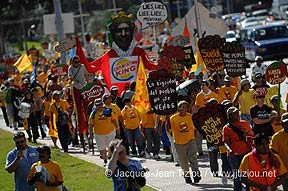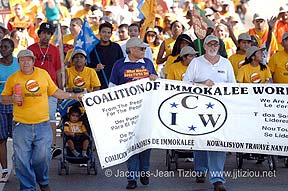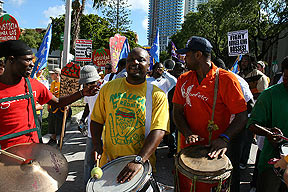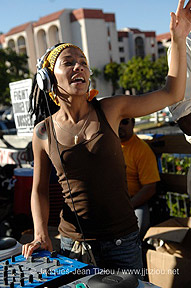Attention, holiday shoppers: here’s some Christmas cheer, brought to you courtesy of officer Claudia Wright and the Daytona Beach police department. But first, let’s review.
Cops in America are heavily armed and trained to be bullies. In order to get control
of situations that they forced their way into, they routinely hurt people, use force first and ask questions later, and pass off even the most egregious violence against harmless or helpless people as self-defense
or as the necessary
means to accomplish a completely unnecessary goal. In order to to coerce compliance with their arbitrary commands, they have no trouble electrifying small children, 82 year old women on a care check
, alleged salad-bar thieves, pregnant women, or an already prone and helpless student who may have been guilty of using the computer lab without proper papers on hand. They are willing to end an argument by pepper spraying lawyers who ask inconvenient questions or by beating up teenaged girls who don’t clean up enough spilled birthday cake or walk home too late at night. They are willing to shock you and leave you lying on the side of the highway in order to make sure they can serve you with a dubious traffic ticket. It hardly matters if you cannot obey their commands because you are sound asleep in your own home. It hardly matters if you can’t move due to a medical condition, or can’t hear their bellowed orders because you’re deaf. What a cop can always count on is that, no matter how aggressively he escalates the use of violence and no matter how obviously innocent or helpless his victims are, he can count on his bosses to repeat any lie and make any excuse in order to find that Official Procedures were followed. As long as Official Procedures were followed, of course, any form of brutality or violence is therefore passed off as OK by the boss cops, and the judgment will be dutifully repeated by cop enablers in the newsmedia and the legal system.
One increasingly popular means for domineering cops to force you to follow their bellowed orders is by using high-voltage electric shocks in order to inflict pain. Tasers were originally introduced for police use as an alternative to using lethal force; the hope was that, in many situations where cops might otherwise feel forced to go for their guns, they might be able to use the taser instead, to immobilize a person who posed a threat to them or to others, without killing anybody in the process. But in practice, police culture being what it is, any notion of limiting tasers to those situations very quickly went out the window. Cops armed with tasers now freely use them to end arguments by intimidation or actual violence, to coerce people who pose no real threat to anyone into complying
with their instructions
, and to hurt uppity civilians
who dare to give them lip. Among civilized people, deliberately inflicting severe pain in order to extort compliance from your victim is called torture;
among cops it is called pain compliance
and is considered business as usual. So shock-happy Peace Officers
can now go around using their tasers as high-voltage human prods in just about any situation, with more or less complete impunity. In those rare cases where media criticism, mass riots, or a lawsuit does force some minimal accountability on the police force, the handful of low-level cops who face punishment are portrayed as bad seeds
by the same high-level officials who, until then, had been covering up or excusing their actions, any systematic criticism of the procedures or legal privileges or internal culture of the whole police force is promptly dismissed, and the whole thing is written off as yet another isolated incident.
In Daytona Beach, Florida, Elizabeth Beeland, a young mother trying to buy a CD player at a local Best Buy, got an upsetting call about her child while she was checking out. She stepped outside to take the call, and she was upset enough that she left her credit card behind at the counter. Perplexed by the sudden exit, the clerk thought that Beeland might have left suddenly because the card was stolen, and called over Claudia Wright, a cop who was in the store. Here’s how this Peace Officer took control of an uncertain and emotionally-charged situation from there:
When police officer Claudia Wright approached, she said Beeland became verbally profane
and abusive.
Wright said she warned Beeland to calm down or face arrest. The officer hit Beeland in the stomach with the Taser darts and arrested her on charges of disorderly conduct and resisting arrest.
In a video, the customer is seen backing away, then crumpling to the ground after being tasered.
— MSNBC (2007-12-21): Officer uses Taser to tame [sic! –R.G.] Best Buy customer
So a distraught mother is blasted with a 50,000-volt electric shock because she dared to yell at a trained professional police officer, and failed to calm down
quickly enough to satisfy the store’s pig-in-residence. Of course, she was backing away from the cop at the time, had her hands raised and visible, did nothing that could even remotely be construed as threatening, and provided no reasonable basis for the cop to presumptively treat her as in any way criminal. (The credit card was, as it happens, not stolen, and at the time Claudia Wright had only the clerk’s unsubstantiated suspicions on which to act as if it were.) But pursuant to the Daytona Beach cops’ policy, she was noncompliant,
and therefore could be subdued,
i.e., tortured into submission for failing to obey a cop’s bellowed order, even if she posed no credible threat to anyone else’s safety.
Of course, there will be an Official Investigation of the Incident, right? Sure:
DAYTONA BEACH, Fla. (AP) — A police officer used a stun gun to subdue a woman who yelled at her in a crowded electronics store, and prosecutors are reviewing whether to pursue charges against the customer.
— Associated Press (2007-12-22): Fla. Officer Shocks Woman Yelling at Her
Let’s review.
DAYTONA BEACH, Fla. (AP) — A police officer used a stun gun to subdue a woman who yelled at her in a crowded electronics store, and prosecutors are reviewing whether to pursue charges against the customer.
— Associated Press (2007-12-22): Fla. Officer Shocks Woman Yelling at Her
Charges for what? Ah, yes:
Police later verified that Beeland was using her own credit card, but she was arrested for disorderly conduct and resisting a police officer without violence. She has since pleaded not guilty.
— MSNBC (2007-12-21): Officer uses Taser to tame [sic] Best Buy customer
In other words, one incredibly vague and immeasurably trivial crime
directly produced by the cop’s incompetent and insensitive handling of the situation, and another crime
which consists in absolutely nothing other than non-violently defying a cop’s arrogant sense of entitlement to shove other people around. Of course, in real life, outside of statist power-trip la-la land, yelling at a police officer
is not a crime, much less one that it would be appropriate to respond to by deliberately inflicting extreme and immobilizing pain.
But, hey, let’s make sure we hear both sides
of this story, which the news media will insist on noncommittally presenting, as if the two were obviously equivalent in accuracy and honesty:
Daytona Beach Police Chief Mike Chitwood defended the officer’s actions, which he said avoided use of other weapons.
Even if you look at the video, when the officer stepped toward her after announcing she’s under arrest, she’s flailing her arms and retreating from the officer,
Chitwood said. Police work isn’t pretty. It doesn’t look pretty, but from where we sit, interviewing civilian witnesses and people may or may not agree, but she followed our policy, she followed FDLE (Florida Department of Law Enforcement) guidelines.
— MSNBC (2007-12-21): Officer uses Taser to tame [sic] Best Buy customer
As long as she followed Official Procedures, of course, any level of aggression and violence against an unarmed and retreating
civilian
(!) is perfectly O.K. for the paramilitary cadres occupying Florida cities. Hell, she’s lucky she didn’t get bludgeoned or shot by other weapons!
For the record, here’s what those Official Guidelines say:
Police department policy states an officer can deploy his or her TASER for the purpose of subduing a violent, noncompliant or combative subject.
— Central Florida News 13: Woman TASED At Best Buy
Please note that since Beeland was not in any way violent,
the claim must be that either she was (1) noncompliant
or (2) combative
(without being violent), or both. If you happen to be in Florida, please note that, even if you in no way threaten the rights or the physical safety of anybody, a professional Peace Officer will still feel professionally entitled to hit you with an excruciatingly painful 50,000-volt electric shock if you (1) don’t ask how high?
when they shout jump,
or (2) dare to give them lip.
Civil liberties and human rights groups may see the incident in a different way
:
Cop Watch’s George Crosley sees the incident in a different way. His group polices police actions. He said he is stunned by the store surveillance video.
This is wrong, this shouldn’t have happened that way,
Crosley said. When the officer starts toward her, you don’t see her threatening the officer, you see her backing off with her hands up,
he said. If she couldn’t figure out how to handle it, she should have called for back up. The truth of the matter is, people have died as a result of being tased.
— MSNBC (2007-12-21): Officer uses Taser to tame [sic] Best Buy customer
Not that it would matter much even if she died, as far as the Authorities are concerned, so long as those guidelines
got followed.
The ACLU and Amnesty International also have Beeland’s back. Her own lawyer is reviewing the incident.
I would like to hope that she sues the pigs personally and takes them for everything they've got. Unfortunately, if a suit is filed, what will probably happen is that the city government will settle the case out of court, have the police department send Beeland an Oops, our bad
along with some petty cash, and then–public servants that they are–send the bill to a bunch of innocent taxpayers, who had nothing to do with it. Meanwhile, precisely nothing will happen to authoritarian shock-happy thug Claudia Wright, who will go right on serving and protecting the hell out of civilians
in Daytona Beach, whether they want anything to do with it or not.
If you're baffled that cops could feel free to indulge in this kind of outrage, and that numerous fellow cops, prosecutors, and other government officials would rush to defend it, well, that’s just about why, right there. The State will never police itself; the government will never make a serious effort to protect you from your supposed protectors.
Support your local CopWatch.










